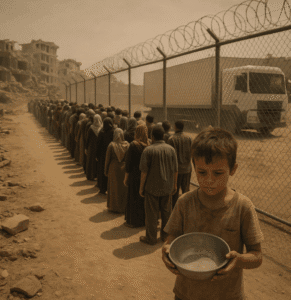Gaza Aid Crisis: 5 Shocking Truths Behind Israel’s “Humanitarian” Plan Exposed
Israel’s newly proposed humanitarian aid mechanism for Gaza has ignited intense backlash, with human rights groups accusing it of institutionalizing starvation as a means of control. Framed as a streamlined aid solution, the plan restricts distribution to complexes near Israeli military sites and is operated by a U.S. private firm—offering only one insufficient weekly package per family. Critics argue it weaponizes aid access to enforce displacement and compliance, deepening the impact of Israel’s 17-year blockade and the ongoing siege that has devastated Gaza’s population and infrastructure. Over 35,000 Palestinians have died since the conflict escalated in October 2023.
By conditioning life-saving assistance on geographic and security criteria, the plan violates international humanitarian law and risks turning desperate civilians into political pawns. The U.S. is accused of complicity through funding and shielding Israel diplomatically while undermining neutral aid groups like UNRWA. Euro-Med Human Rights Monitor calls for urgent global action: to reject this aid framework, ensure legal accountability, and restore unrestricted, needs-based humanitarian access. As famine looms, Gaza’s crisis poses a defining moral challenge to the international community.

Gaza Aid Crisis: 5 Shocking Truths Behind Israel’s “Humanitarian” Plan Exposed
The latest proposal by Israel to regulate humanitarian aid in Gaza has sparked fierce condemnation from human rights groups, who warn it may deepen one of the most severe humanitarian crises in modern history. According to a detailed report by Euro-Med Human Rights Monitor, the plan—framed as a solution to streamline aid—is accused of legitimizing starvation as a tool of control, exacerbating a 19-month genocide and siege that has left Gaza’s 2.3 million residents in dire straits.
The Mechanics of Control
Israel’s proposed mechanism, developed in coordination with the U.S., involves creating an “international fund” managed by donor countries. Aid distribution would occur through tightly controlled complexes near Israeli military sites, operated by a private U.S. security firm. Each Palestinian family would receive one weekly package, insufficient to meet basic needs, while Israel oversees every aspect—from aid type to distribution. Critics argue this framework transforms survival into a privilege, contingent on compliance with Israeli security demands.
A History of Suffocation
This plan echoes Israel’s long-standing blockade of Gaza, in place since 2007, which has restricted the flow of food, medicine, and fuel. The current conflict, reignited in October 2023, has seen over 35,000 Palestinians killed (per local health authorities), alongside systematic infrastructure destruction. Euro-Med highlights parallels to Israel’s 2024 northern Gaza invasion, where aid access was weaponized to force displacement. Families were coerced into relocating to so-called “safe zones” like al-Mawasi under threat of starvation—a tactic now institutionalized, rights groups warn.
Legal and Moral Violations
International law unequivocally prohibits using starvation as a weapon of war (Geneva Conventions) and mandates occupying powers to ensure civilian welfare. By conditioning aid on security criteria and geographic access, Israel’s plan flouts these principles. Worse, concentrating distribution near military zones risks transforming complexes into tools of demographic engineering, pressuring desperate families to abandon homes for aid access—a potential precursor to permanent displacement.
Complicity and Silence
The U.S. plays a dual role: funding Israel’s military arsenal while backing this aid mechanism. This complicity, Euro-Med argues, extends a pattern of diplomatic shielding, including vetoing UN ceasefire resolutions. Outsourcing distribution to a U.S. firm thinly veils Israel’s control, enabling plausible deniability while maintaining chokeholds on sustenance. Meanwhile, attacks on UNRWA and local NGOs—the most effective aid channels—further isolate civilians.
The Path Forward
Euro-Med urges immediate international action:
- Reject the Plan: Refuse funding or participation in a mechanism that codifies starvation.
- Enforce Accountability: Demand ICC prosecutions for Israeli leaders and sanctions against entities aiding Gaza’s siege.
- Restore Unrestricted Aid: Open all crossings (land, sea, air) for neutral, needs-based distribution.
- Protect Humanitarian Workers: End targeting of aid facilities and personnel, a grave breach of international law.
A Test for Humanity
Gaza’s crisis is not a natural disaster but a manufactured one. As famine looms, the world faces a moral litmus test: Will it challenge a system that reduces aid to a bargaining chip, or complicitly normalize collective punishment? The answer will define the trajectory of international justice—and the survival of a people.
You must be logged in to post a comment.